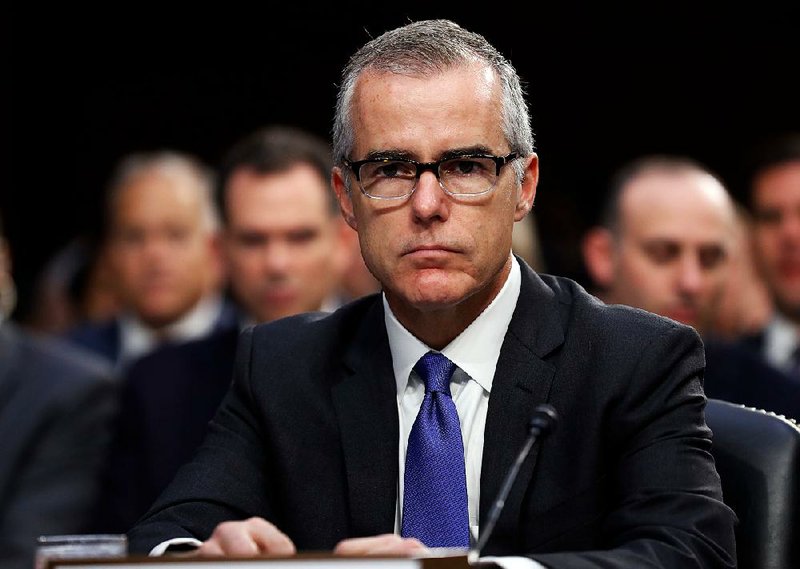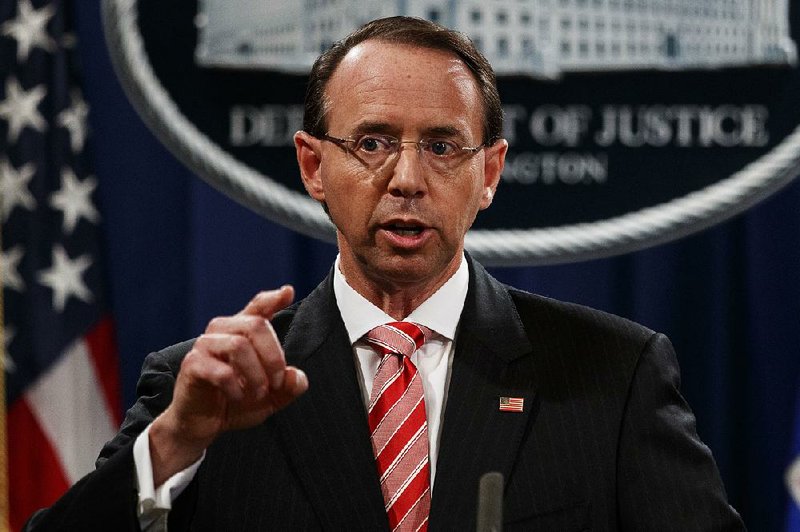WASHINGTON -- The deputy attorney general, Rod Rosenstein, suggested last year that he secretly record President Donald Trump in the White House to expose the chaos consuming the administration, and he discussed recruiting Cabinet members to invoke the 25th Amendment to remove Trump from office for being unfit.
Rosenstein made these suggestions in the spring of 2017 when Trump's firing of James Comey as FBI director plunged the White House into turmoil. Over the ensuing days, the president divulged classified intelligence to Russians in the Oval Office, and revelations emerged that Trump had asked Comey to pledge loyalty and end an investigation into a senior aide.
Rosenstein was just two weeks into his job. He had begun overseeing the Russia investigation and played a key role in the president's dismissal of Comey by writing a memo critical of his handling of the Hillary Clinton email investigation. But Rosenstein was caught off guard when Trump cited the memo in the firing, and he began telling people that he feared he had been used.
Rosenstein made the remarks about secretly recording Trump and about the 25th Amendment in meetings and conversations with other Justice Department and FBI officials. Several people described the episodes, insisting on anonymity to discuss internal deliberations. The people were briefed either on the events themselves or on memos written by FBI officials, including Andrew McCabe, then the acting bureau director, that documented Rosenstein's actions and comments.
None of Rosenstein's proposals apparently came to fruition. It is not clear how determined he was about seeing them through, though he did tell McCabe that he might be able to persuade Attorney General Jeff Sessions and John Kelly, then the secretary of homeland security and now the White House chief of staff, to mount an effort to invoke the 25th Amendment.
Friday's news reports threatened to cloud Rosenstein's fate at the Justice Department, with some conservative commentators calling for him to be fired immediately. Any dismissal could affect Robert Mueller's Russia probe given that Rosenstein appointed Mueller special counsel and oversees his work.
Trump ignored questions shouted from reporters as he arrived for an evening rally in Springfield, Mo. The White House did not respond to questions about Rosenstein's reported remarks.
But at the rally, the president said, "We have great people in the Department of Justice. But there are some bad people.
"You see what's happened at the FBI. They're all gone. They're all gone. They're all gone. But there's a lingering stench, and we're going to get rid of that, too."
It was difficult amid the conflicting accounts to discern the precise context for his comments and how they were intended.
Sitting in on Trump's interviews with prospective FBI directors and facing attacks for his own role in Comey's firing, Rosenstein had an up-close view of the tumult. Rosenstein appeared conflicted, regretful and emotional, according to people who spoke with him at the time.
Rosenstein disputed this account.
"The New York Times' story is inaccurate and factually incorrect," he said in a statement. "I will not further comment on a story based on anonymous sources who are obviously biased against the department and are advancing their own personal agenda. But let me be clear about this: Based on my personal dealings with the president, there is no basis to invoke the 25th Amendment."
One of the people briefed on the conversation in question, who spoke on condition of anonymity because of the confidential nature of the interaction, said it occurred during a moment of frustration between McCabe and Rosenstein.

Rosenstein was rankled by the revelation that Comey had kept memos about his interactions with the president; McCabe wanted a more aggressive approach toward the White House, the person said.
At that point, Rosenstein said to McCabe something to the effect of, "What do you want, you want me to wear a wire?" according to the person. Rosenstein was then asked in the meeting if he was serious, and he said yes, but he did not mean for the wire comment to be taken seriously as a tactic to investigate the president, the person said.
But according to the others who described his comments, Rosenstein not only confirmed that he was serious about the idea but also followed up by suggesting that other FBI officials who were interviewing to be the bureau's director could also secretly record Trump.
Rosenstein also mentioned the possibility of wearing a wire on at least one other occasion, the people said, though they did not provide details.
McCabe, who was later fired from the FBI, declined to comment. His memos have been turned over to the special counsel, Mueller, in the investigation into whether Trump associates conspired with Russia's election interference, according to a lawyer for McCabe. "A set of those memos remained at the FBI at the time of his departure in late January 2018," the lawyer, Michael R. Bromwich, said of his client. "He has no knowledge of how any member of the media obtained those memos."
Days after ascending to the role of the nation's No. 2 law enforcement officer, Rosenstein was thrust into a crisis.
In May, Rosenstein and his boss, Sessions, who had recused himself from the Russia investigation because of his role as a prominent Trump campaign supporter, joined Trump in the Oval Office. The president informed them of his plan to oust Comey. To the surprise of White House aides who were trying to talk the president out of it, Rosenstein embraced the idea, even offering to write the memo about the Clinton email inquiry. He turned it in shortly after.
A day later, Trump announced the firing, and White House aides released Rosenstein's memo, labeling it the basis for Comey's dismissal. Democrats sharply criticized Rosenstein, accusing him of helping to create a cover story for the president to rationalize the termination.
"You wrote a memo you knew would be used to perpetuate a lie," Sen. Christopher Murphy, D-Conn., wrote on Twitter. "You own this debacle."
The president's reliance on his memo caught Rosenstein by surprise, and he became angry at Trump, according to people who spoke to Rosenstein at the time. He grew concerned that his reputation had suffered harm.
A determined Rosenstein began telling associates that he would ultimately be "vindicated" for his role in the matter. One week after the firing, Rosenstein met with McCabe and at least four other senior Justice Department officials, in part to explain his role in the situation.
During their discussion, Rosenstein expressed frustration at how Trump had conducted the search for a new FBI director, saying the president was failing to take the candidate interviews seriously. A handful of politicians and law enforcement officials, including McCabe, were under consideration.
To Rosenstein, the hiring process was emblematic of broader dysfunction stemming from the White House. He said both the process and the administration itself were in disarray, according to two people familiar with the discussion.
Rosenstein then raised the idea of wearing a recording device, or "wire," as he put it, to secretly tape the president when he visited the White House. One participant asked whether Rosenstein was serious, and he replied animatedly that he was.
In the end, the idea went nowhere, the officials said. But they called Rosenstein's comments an example of how erratically he was behaving while he was taking part in the interviews for a replacement FBI director, considering the appointment of a special counsel and otherwise running the day-to-day operations of the more than 100,000 people at the Justice Department.
At least two meetings took place on May 16 involving both McCabe and Rosenstein, the people familiar with the events of the day said. Rosenstein brought up the 25th Amendment during the first meeting of Justice Department officials, they said.
He did not appear to talk about it at the second, according to a memo by one participant, Lisa Page, a lawyer who worked for McCabe at the time, that did not mention the topic.
Rosenstein's suggestion about the 25th Amendment was similarly a sensitive topic. The amendment allows for the vice president and a majority of Cabinet officials to declare the president is "unable to discharge the powers and duties of his office."
Merely conducting a straw poll, even if Kelly and Sessions were on board, would be risky if another administration official were to tell the president, who could fire everyone involved to end the effort.
McCabe told other FBI officials of his conversation with Rosenstein. None of the people interviewed said that they knew of him ever consulting Kelly or Sessions.
The episode is the first known instance of a named senior administration official weighing the 25th Amendment. Unidentified others have been said to discuss it, including an unnamed senior administration official who wrote an op-ed for The New York Times. That person's identity is unknown to journalists in the Times news department.
Rosenstein has been a target of Trump's ire since appointing Mueller as a Justice Department special counsel to investigate potential coordination between Russia and the Trump campaign during the 2016 presidential election.
He chose Mueller for the job one week after he laid the groundwork for the firing of Comey by writing a memo that criticized Comey's handling of the FBI's investigation of Clinton's email server.
The White House initially held up that memo as justification for Comey's firing, though Trump himself has said he was thinking about "this Russia thing" when he made the move.
As deputy attorney general, Rosenstein oversees Mueller's work and has made two public announcements of indictments brought by the special counsel -- one against Russians accused of hacking into Democratic email accounts, the other against Russians accused of running a social media troll farm to sway public opinion.
On Friday, Trump's eldest son, Donald Trump Jr., tweeted the Times story and said: "Shocked!!! Absolutely Shocked!!! Ohhh, who are we kidding at this point? No one is shocked that these guys would do anything in their power to undermine realdonaldtrump."
The story also elicited a quick response from members of Congress.
Rep. Mark Meadows, a North Carolina Republican who chairs the conservative Freedom Caucus, said in a tweet that "if this story is true, it underscores a gravely troubling culture at FBI/DOJ and the need for FULL transparency."
Senate Democratic leader Charles Schumer of New York said the Times story "must not be used as a pretext for the corrupt purpose of firing Deputy Attorney General Rosenstein in order to install an official who will allow the president to interfere with the special counsel's investigation."
Information for this article was contributed by Adam Goldman and Michael S. Schmidt of The New York Times; by Michael Balsamo, Eric Tucker and Jill Colvin of The Associated Press; and by Bill Bowden of the Arkansas Democrat-Gazette.
RELATED ARTICLES
https://www.arkansa…">Trump reverses his order to declassify probe datahttps://www.arkansa…">2 Democrats seek documents on White House efforts to hire banker
A Section on 09/22/2018
